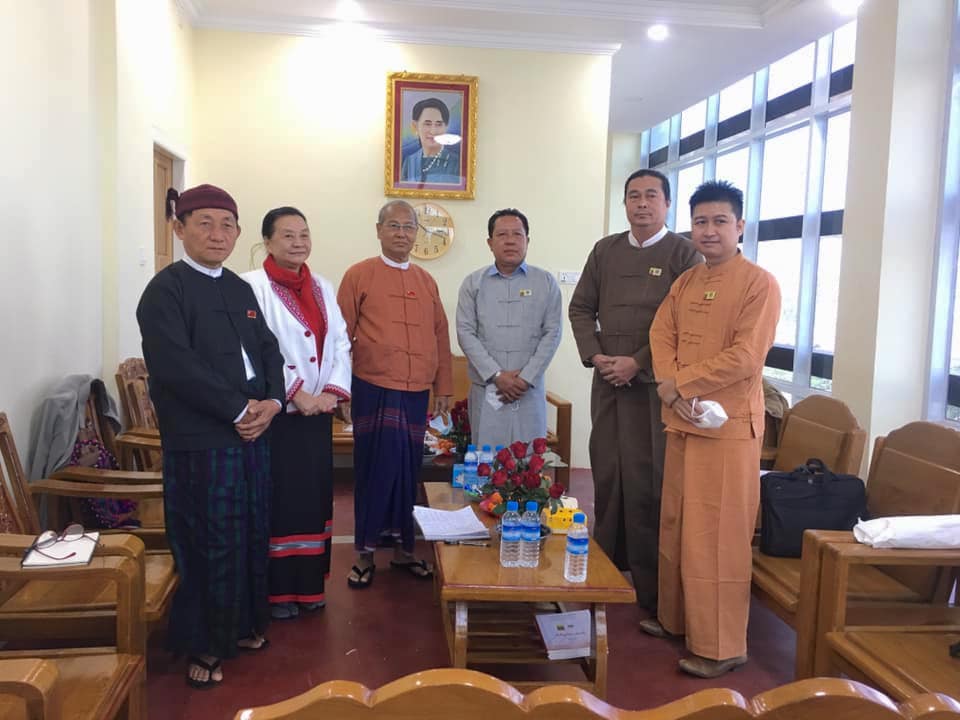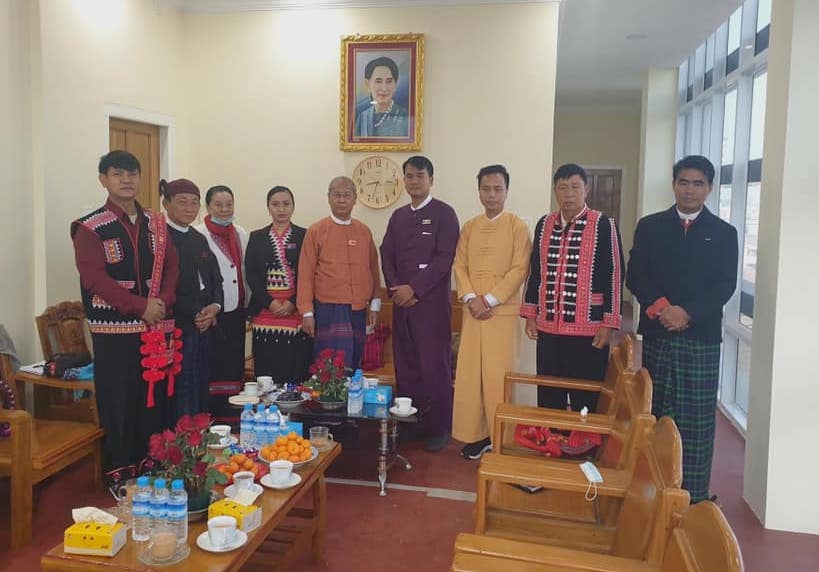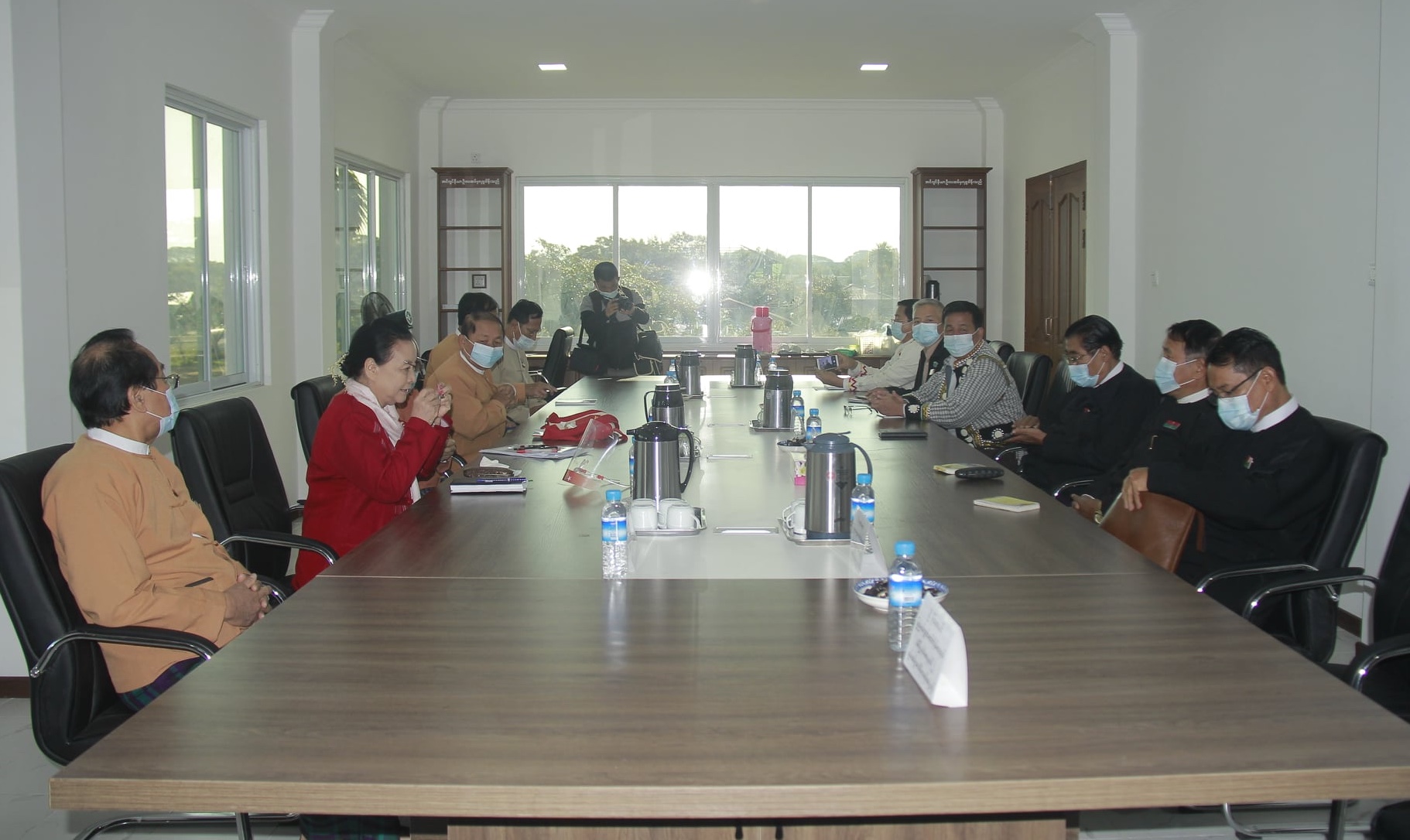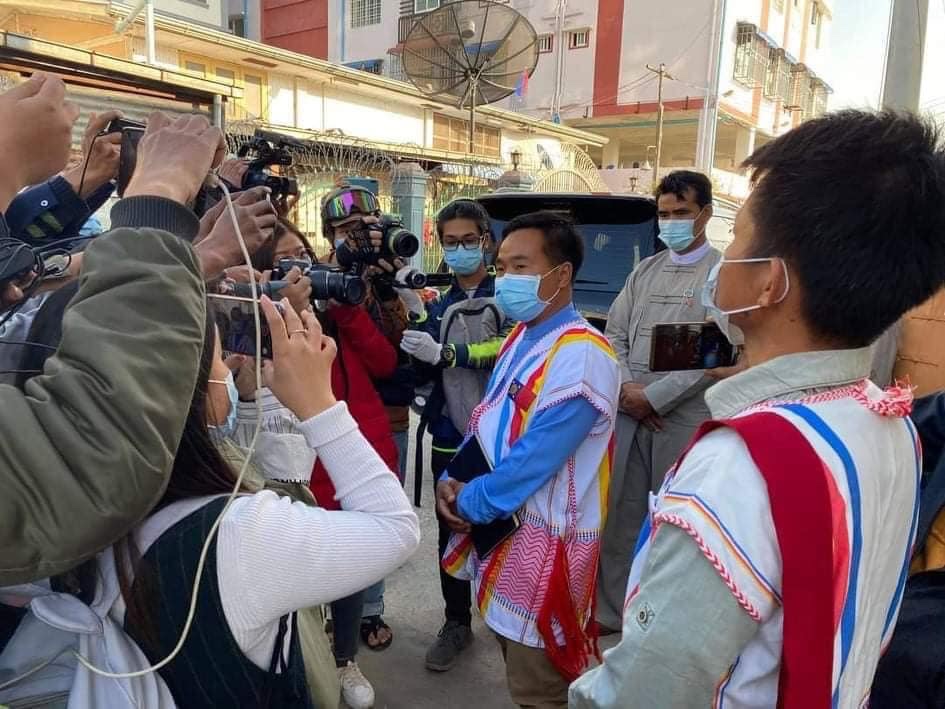Whenever ceasefire talks between Myanmar’s government, military and active ethnic armed groups have been postponed over the past decade, a common hurdle has been the choice of venue or some other dispute relating to the meeting place.
Negotiators for the ethnic armed groups prefer a neutral, third-party location because of security concerns. For instance in 2019, peace talks between the government and the Northern Alliance were delayed for months due to a disagreement over the choice of location.
The dispute affected the pace of peace talks and stalled both a ceasefire and subsequent political negotiations in the country, which is still trying to find a political solution to overcome seven decades of civil war.
Today, the choice of venue is still an obstacle. But this time around, the dispute is among political parties–specifically, between the ruling National League for Democracy (NLD) and political parties representing the country’s various ethnic groups.
On Nov. 12, days after winning November’s election in a landslide, the NLD made overtures to 48 ethnic parties proposing that they work with the ruling party on ethnic affairs and ending the civil war. Achieving peace and reconciliation are among the NLD’s key ambitions for its second term in office. As of Thursday, 22 ethnic parties had responded to the overtures.
Last month, the NLD formed a team comprising three of the party’s senior leaders—Magwe Region Chief Minister Dr. Aung Moe Nyo, Karen State Chief Minister Daw Nan Khin Htwe Myint, who is also a member of the party’s Ethnic Affairs Committee, and Lower House parliamentarian Ntung Hka Naw Sam, who chairs the committee—to hold discussions with the ethnic parties.

Ruling party’s messengers
Their sole task is to listen to the voices of the parties and to convey their concerns to the NLD’s Central Executive Committee, which will make any decisions. But it is an important step in the formation of a national unity government, a concept put forward by the incumbent government’s spokesman before the Nov. 8 election.
NLD spokesman Dr. Myo Nyunt told The Irrawaddy that the NLD’s team will gather the ethnic political parties’ views on a new Union and hear their suggestions for the upcoming parliament and government structures.
Gathering those views is most important, he said, because “the new Union” should reflect “the ethnic political parties’ perspectives.” Building a future Union, based on democratic principles and basic federal principles, has been at the center of the NLD government’s political negotiations. Then, he said, “The ethnic political parties may want roles in the leadership of the upcoming parliament and in the cabinets, and if they do, we will consider their proposals [in the decision-making] for parliament and cabinets.”
Learning the lessons of 2015
The NLD made no such political offer back in 2015 after its landslide victory that year. That omission subsequently caused a rift between the NLD and Myanmar’s ethnic political parties. Having learned its lesson, this time the party is moving to bring the ethnic parties on board before the new administration starts in April.
For all its willingness to engage in dialogue, however, the NLD continues to insist on meeting the state-based parties at its branch offices in the respective states. Dr. Myo Nyunt explained that from the NLD’s perspective, it has the right to choose the venue as it is “the host”, and the local parties are invited “guests”.
The NLD’s delegation traveled to Kachin, Mon, Kayah and Shan states this month to meet with local parties, all of which have strong local support in their respective ethnic communities. As of Friday, the NLD team had met separately with 10 parties representing ethnic Kachin, Lisu, Shan, Lahu, Wa, Pa-O, Ta’ang and Kayan. Those meetings took place at the NLD’s local offices.

Unsuccessful meetings
However, this policy of only holding meetings at the NLD’s offices has disappointed some ethnic political parties.
The planned meetings between the NLD and two parties—the Mon Unity Party (MUP) on Jan. 4 and the Kayah State Democratic Party (KySDP) on Jan. 12—did not happen, because the MUP and KySDP could not accept the NLD’s venue.
The MUP and KySDP, which both have strong local support in their constituencies, insisted that neutral locations would allow them to talk more freely. In addition, both ethnic parties said they could not accept the fact that the NLD would only meet with MPs-elect from each party.
Both sides—the NLD and the two parties—have been criticized for their inflexibility.
Amid the criticism, Nai San Tin, general secretary of the MUP, said the party stands by its policy, which holds “that it is best for two parties to meet somewhere neutral. It is not appropriate to meet at either their office or our office.”
Following the MUP’s lead, KySDP general secretary Khu Theh Reh said his party would only meet the NLD in a neutral location. He accused the NLD of adopting “a superior attitude” as the winning party, claiming it wanted ethnic parties to be subordinate to it and that it simply made demands instead of seeking to collaborate.
Dr. Aung Moe Nyo rejected that argument and said the NLD’s aim was not to adopt a dominant position, but rather to listen and meet the local parties, because the ruling party cares about their concerns. He said recently the delegation would return to Mon State before the parliament convenes for its new term on Feb. 1.

Fractured relationships
The intransigence could stem from recent history.
The relationships between the NLD government and a majority of ethnic Mon and Karenni have been badly strained over the NLD’s efforts to assert the legacy of General Aung San, the father of Daw Aung San Suu Kyi, who is the NLD chairman and the State Counselor.
In 2017, over local ethnic Mon objections, the NLD named the 1.5-km bridge linking Mawlamyine and Chaungzon townships on the Salween River as the General Aung San Bridge. The NLD insisted the move was intended to honor Gen. Aung San’s integrity, to remember his legacy, and to commemorate the spirit of the Union he launched.
Despite the controversy, the ruling party did not learn its lesson. The Kayah State government erected a statue of Gen. Aung San in Loikaw against the wishes of local residents in 2019.
That move inflamed political tensions between the Kayah State government and local young people. The government responded with a crackdown on people protesting against the statue, arresting and imprisoning them. That miscalculation led many young people who had supported the NLD in 2015 to shift their support to the local KySDP.
One source close to the parties in Kayah State, speaking on condition of anonymity, said the NLD has demonstrated weakness in its attempts to win ethnic support, although it has good intentions and goodwill. However, he added, the KySDP lacks political savvy, failing to raise key ethnic issues or establish their position on the NLD’s proposed national unity government.
It looks now “like a ceasefire negotiation where the discussions of key issues are delayed by the dispute over the location,” he said.
As the messenger between the NLD’s Central Executive Committee and the local parties, the delegation led by Dr. Aung Moe Nyo “should be given authority to have flexibility” to achieve its goal of meeting with the local parties, observers said.
Political analyst U Ye Tun said the dispute shows that the NLD lacks a policy to delegate sufficient flexibility to its messengers. Instead, it sticks to having talks in a set location.
The content of negotiations is more important than the venue and there should not be pre-conditions such as a set location or only agreeing to meet the MPs-elect in this case, echoed U Myo Win, who has served as a peace negotiator for the past nine years.

Why are they meeting?
Many politicians, while they are not happy about the NLD’s rigidity on the venue, believe it is important to meet as it creates space for the parties to raise issues of federalism and ethnic issues.
Dr. Tu Ja, the chairman of the Kachin State People’s Party (KSPP) said, “The meeting itself is more important than the venue in politics.” The KSPP raised its position on peace and reconciliation and the NLD’s national unity government during their meeting on Jan. 1. It was among the first three political parties to meet with the NLD in Myitkyina.
Ethnic Ta’ang and Pa-O parties’ representatives who met with the NLD delegation in Shan State on Wednesday said they went to the NLD office for the sake of advancing the Union’s affairs.
Sai Kyaw Nyunt, a general secretary and a spokesman of the Shan Nationalities League for Democracy (SNLD), said they would cooperate with the NLD on national unity and peace, following their meeting on Friday. The SNLD won the 42 seats nationwide, becoming the third-largest party, after the November election. The party had two sessions of informal talks with the NLD before Friday’s meeting on Jan. 7 and Jan. 14.
The SNLD spokesman added that the party wanted to avoid the fallout that occurred in Mon and Kayah states, and put forward its political visions for Union-building. Then the party offered to help broker a meeting between the NLD and the Mon and Kayah parties.
This week’s successful meetings between the NLD delegation and the parties in Shan State may be a sign that Myanmar is likely to see more ethnic politicians from parties that won seats in the election take part in the NLD’s new national unity government.
However, the question remains whether the NLD can successfully incorporate diverse representation without the cooperation of ethnic-based political parties such as the Mon and Kayah parties.
You may also like these stories:
Myanmar Military Chief Makes Life Awkward for Chinese Foreign Minister
Myanmar’s Purchase of Planes From Jordan a Sign of Things to Come
Will Myanmar’s Two Most Powerful Figures Strike a Grand Bargain?

















